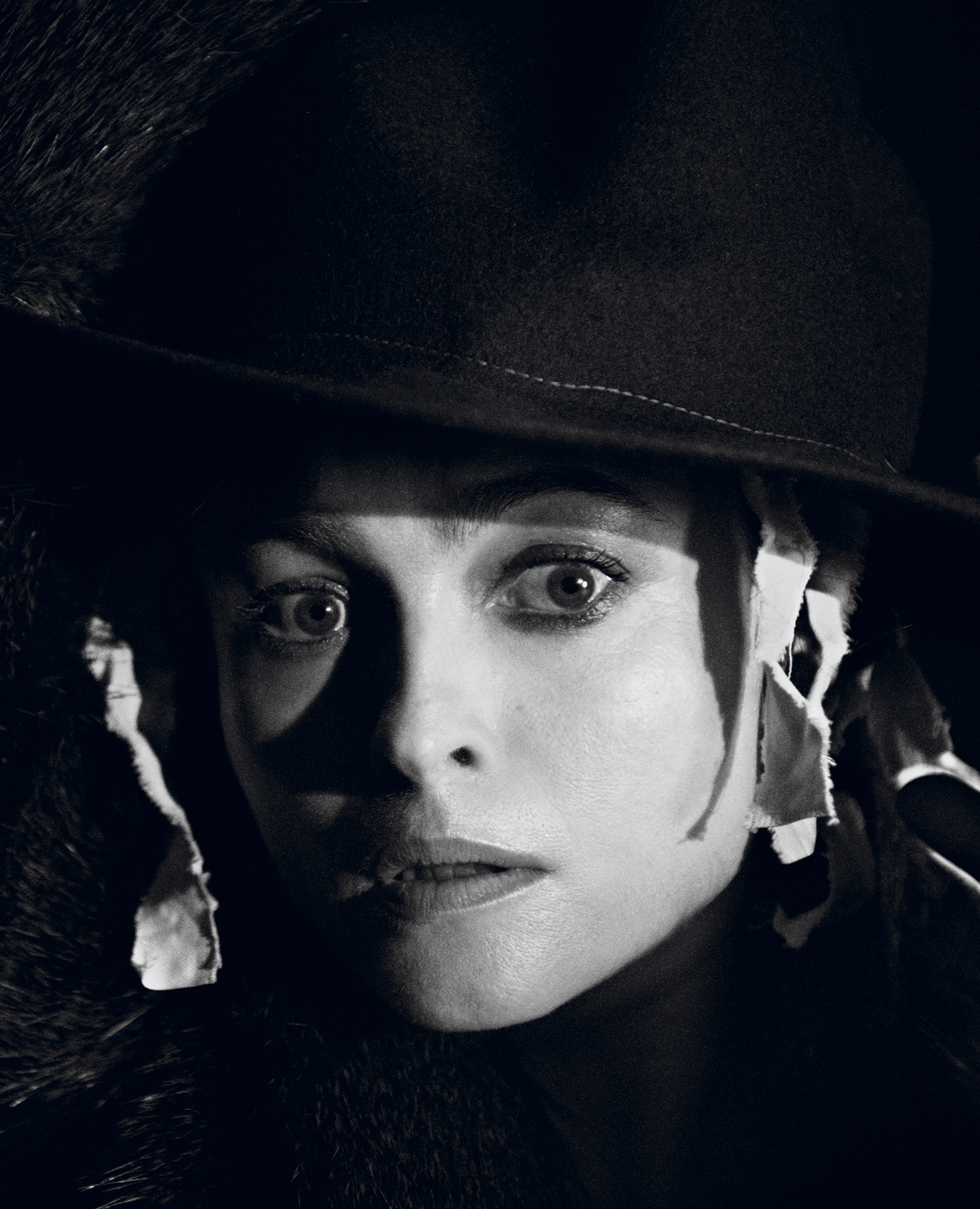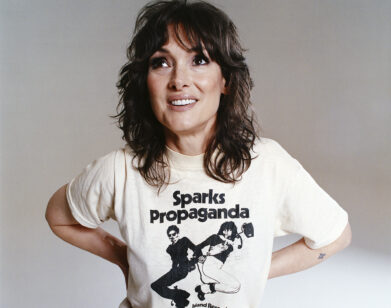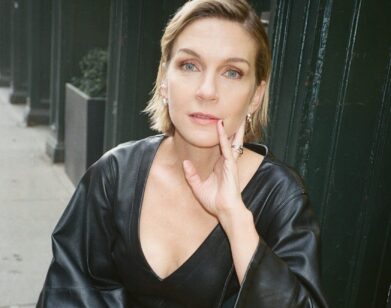Helena Bonham Carter
My son, Billy, would ask, ‘Do you have to be the witch or the queen tomorrow?’ I thought, Well, that’s pretty much my life.Helena Bonham Carter
In A Room with a View (1985), 19-year-old Helena Bonham Carter gave an indelible performance as Lucy Honeychurch, E.M. Forster’s pensive heroine who chooses between love and propriety in Edwardian England. So perfectly did the striking young actress-with her wide eyes, dark tresses, and milky skin-bring to life such literary characters as Lucy (not to mention tragic teenagers Lady Jane Grey and Ophelia) that she quickly became the archetypal period-drama protagonist. But by the late ’90s, Bonham Carter began to play against type, taking on roles considerably quirkier and edgier than the rose-lipped maidens of her more conventionally corseted phase. The more damaged the character, the more challenging the conditions, the better-at least that’s what Bonham Carter seemed to have been saying by going on to take on the role of a paraplegic in 1998’s The Theory of Flight, opposite then-boyfriend Kenneth Branagh. The following year, she played the spiky-haired, chain-smoking love interest to Brad Pitt/Edward Norton’s Tyler Durden in David Fincher’s Fight Club (1999). For that role, the London-born actress demonstrated her willingness to get dark and a little maniacal. That she is also not afraid to make herself look grotesque or even ridiculous is part of her charm. Think of the set of gnarly false teeth she sported as the evil Bellatrix Lestrange in three Harry Potter movies. Or her willingness to transform herself into a primate, as she did for Planet of the Apes (2001), a film which, though perhaps not itself a critical high-water mark in her career, signaled the beginning of her ongoing personal and professional relationship with its director, Tim Burton. In Bonham Carter, Burton found the perfect muse for slyly macabre fantasy fiction. Over the past decade they have made seven films together-and more than a few of the Bonham Carter’s characters in those movies have been touched by madness. In fact, some of them have been downright scary, such as the Demon Barber of Fleet Street’s meat pie-baking accomplice Mrs. Lovett in Sweeney Todd (2007), and the tyrannical Red Queen in Alice in Wonderland (2010).
Evilness aside, the witchy voluptuousness of some of Bonham Carter’s on-screen characters is not dissimilar from her infamously whimsical off-screen style. Her fondness for dressing in eccentric, multilayered ensembles has for years landed her on both best- and worst-dressed lists. As a nominee for best actress at the 2011 Golden Globes for her work in The King’s Speech, Bonham Carter walked the red carpet wearing a low-cut Vivienne Westwood number in tulle-covered floral accessorized with different shoes: one red and the other green. Predictably, this kind of irreverent move had its share of detractors, but it was precisely its devil-may-care zaniness that inspired Marc Jacobs to ask her to be the face of his Fall 2011 ad campaign.
Bonham Carter’s latest collaboration with Burton is the new film Dark Shadows. Due out this month, it is based on the late 1960s Gothic soap opera of the same name, and tells the story of a 200-year-old vampire (played by another Burton regular, Johnny Depp) who returns home to descendents so deeply troubled that they have invited a psychiatrist with a drinking problem (Bonham Carter) to live with them.
Whether she’s playing an English rose or a sadomasochistic witch, Bonham Carter has never ceased to be interesting-as her Harry Potter costar, Daniel Radcliffe, well knows. Radcliffe visited with the 45-year-old Bonham Carter at one of the two homes she shares with Burton and their two children in London.
DANIEL RADCLIFFE: You have quite an overachieving family.
HELENA BONHAM CARTER: Do you think so?
RADCLIFFE: Well, you’re descended from a prime minister, several politicians, and a very influential director. And your maternal granddad was a Spanish diplomat who was awarded the Righteous Among the Nations a few years ago, which is amazing. And your mother is a psychotherapist.
BONHAM CARTER: Wow. You know more than I do.
RADCLIFFE: But that intellectual milieu—how did that launch you? Because you did start young.
BONHAM CARTER: It was nothing to do with where I came from, in the sense that mum and dad never brought us up with any kind of pressure. There weren’t any expectations, which was great. But I was incredibly self-critical and very driven. Thank god I got slightly less self-critical as I got older.
RADCLIFFE: Have you then? Does that go slightly?
BONHAM CARTER: Oh yes. Don’t worry. It’s so much better when you get older.
RADCLIFFE: Oh, thank god.
BONHAM CARTER: I think you physically fall apart. But mentally, it’s so much easier.
RADCLIFFE: I certainly suffer from a slight inferiority complex when I step into a room of other actors because I’ve never trained, and I know you haven’t either.
BONHAM CARTER: Oh, I had a big inferiority complex till yesterday.
RADCLIFFE: But not today!
BONHAM CARTER: Everybody has an inferiority complex when they step into a room. But then when you have children and you get older, it doesn’t really matter. When I was young I had so many inferiority complexes. I had an inferiority complex because I didn’t go to university. I had an inferiority complex because I didn’t train. Then it gets tiring. And you do get bored of it.
RADCLIFFE: Right. And so that boredom is actually what ultimately leads you to go, “Oh, fuck it.”
BONHAM CARTER: “Fuck it” is my guiding philosophy.
RADCLIFFE: I think people see your career as almost having two halves, one where you played this kind of ingénue. And then there’s a perception that around the time you met Tim [Burton], you started getting weird. But I know you’d been weird long before that.
BONHAM CARTER: I was weird right from the start. It’s just that you can’t ever expect people to get you. And I do think that really did mess with my head, being well-known young, when you really don’t know who you are. This is how ridiculous I was: I’d sometimes go look at a written profile of me and see how I was described and say, “Oh, is that who I am?” You can’t ever put your self-definition in the hands of somebody who meets you for 15 minutes.
RADCLIFFE: Typecast is a strange word. All characters are not the same. It’s a very easy thing to say that somebody’s typecast.
BONHAM CARTER: All those corseted period-dramas. But what was so great about those parts was that they were all from novels. They provided, instantly, way more subtle characterization. I remember that my agent said, “You can’t do Where Angels Fear to Tread [1991] and Howard’s End [1992].” I said, “Why not? Show me a better part.”
RADCLIFFE: Your Harry Potter character, Bellatrix Lestrange, is one of the scariest characters in the books. But I think it’s fair to say that she is very playful and quite sexy as well.
BONHAM CARTER: When they sent the part, I thought, What am I going to do here? Because, actually, on the page, she wasn’t all there, so I thought, Well, you’ve got to be noticed. And Bellatrix—kids were terrified of her. So I think, Okay, I’ve got to be scary. But then also, if you’re with kids, you want to have fun being naughty.
I do think that really messed with my head, being well-known young, when you really don’t know who you are.Helena Bonham Carter
RADCLIFFE: Do you think you take inspiration from kids a lot? Because I do. They’re very honest in how they act and how they are in the world.
BONHAM CARTER: Oh, yeah. They are. And I also think there’s a lot of Peter Pan about me anyway. I never really wanted to grow up. I grew up really young. I moved out when I was 13—that’s when I started acting. Dad was really ill—he was pretty much paralyzed—so there was a part of me that felt like I had to become responsible.
RADCLIFFE: You thought that you had to provide. Or help, at least.
BONHAM CARTER: Yeah. I was trying to make up for what had happened to him. I wasn’t even conscious of it. There was a lot of vicarious living because he was paralyzed. I thought that if I did something, it would make it better somehow.
RADCLIFFE: Which you probably did in some ways.
BONHAM CARTER: In a way, I did.
RADCLIFFE: You’ve had a wonderful life, and what more does any parent want than to be extremely proud of their kids? Oh, and speaking of, congratulations. You won BAFTA last year for The King’s Speech.
BONHAM CARTER: Thank you.
RADCLIFFE: That’s very exciting, and you were terrified before that film. You were on Potter, and you were filming it at the same time. You were doing double duty.
BONHAM CARTER: I was doing double duty. I never actually said yes to that film. I said no so many times. [Director] Tom Hooper is relentless, so if he wants something, then he will get it. You end up saying, “Oh, fuck it, I’ll do it.”
RADCLIFFE: Really? Just by persistence?
BONHAM CARTER: It’s just easier—and also it was shooting down the road. But you know, my son Billy would ask, “Do you have to be the witch or the queen tomorrow?” I thought, Well, that’s pretty much my life.
RADCLIFFE: Do you have to be either the witch or the queen tomorrow—a decision to make. When I put the recorder down on your desk, I picked up a pile of mail, and the title of the book that was under that pile was revealed: What’s a Poor Girl to Do? Prostitution in Mid-Nineteenth Century America.
BONHAM CARTER: [in Southern drawl] If all else fails, that’s my fallback situation.
RADCLIFFE: Is that your Southern accent?
It’s Tim Burton. He’s a genius. You can’t turn him down just because you go out with him and have two children together.Helena Bonham Carter
BONHAM CARTER: It’s for a part. You get to research things like this. The great thing about our job is that it makes us do stuff we’re naturally too lazy to do. I’m proud of myself that I’m finally doing tap lessons. That was a New Year’s resolution. I thought, “Just do it! When are you going to make the time?”
RADCLIFFE: Absolutely. And there’s a lot of wooden floors in this house, so you can go to town. What’s your relationship with musicals? Did you listen to them growing up?
BONHAM CARTER: I love musicals. Honestly, I’d always wanted to be in a musical, and I’d always wanted to be Mrs. Lovett [her role in Sweeney Todd], so when Tim said, “I’m going to make it, but you can audition if you want, you know . . .
RADCLIFFE: I remember you practicing singing.
BONHAM CARTER: Yes, again, you were there!
RADCLIFFE On the fifth [Harry Potter] film. I remember thinking, What is going to happen to Tim if she doesn’t get this part? I think it’s important to say you were also auditioning for [Stephen] Sondheim [a co-author of the original musical who was consulted for Burton’s film]. And that’s incredibly tough. What was that experience like?
BONHAM CARTER: It was one of the worst humps in our marriage. Not that we’re married, but it’s really hard—
RADCLIFFE: Oh, you’re not married?
BONHAM CARTER: We’re not, actually. Not through any kind of . . . Through laziness, really.
RADCLIFFE: Well, kids are quite a commitment, really, aren’t they?
BONHAM CARTER: Yeah, our houses are married.
RADCLIFFE: Yes! Which I love. What’s interesting is when I talk to people my age about this, they go, “That’s a bit weird.” I say it to people who have children, and they are so envious! [both laugh] They’re all incredibly jealous of your situation.
BONHAM CARTER: It is very good to have. [in a Southern accent] If you can possibly afford to have two joining houses . . .
RADCLIFFE: It doesn’t feel like two houses. It is a great idea—you both obviously need your space.
BONHAM CARTER: You definitely need your space.
RADCLIFFE: That’s so brilliant. So can you talk about Dark Shadows? ‘Cause I don’t know the series really—
BONHAM CARTER: I didn’t know it. I knew that Tim used to race home when he was a school kid and watch Dark Shadows, which was this really crappy soap opera-sort of Gothic soap opera, but it’s all set around 1970. It’s basically about Barnabus Collins, an unhappy vampire—a reluctant vampire.
The great thing about our job is that it makes us do stuff we’re naturally too lazy to do.Helena Bonham Carter
RADCLIFFE: Oh, cool! And you play Dr. Julia Hoffman?
BONHAM CARTER: I play the resident psychiatrist, who’s an alcoholic. There’s this sort of odd family . . . Barnabus Collins is resurrected from his coffin, and he comes back to his family. He’s been away for 200 years. And Michelle Pfeiffer is, I guess, his great-niece by seven times.
RADCLIFFE: Excellent.
BONHAM CARTER: It was kind of worrying when I read it, because there’s a sexy witch part. At the beginning of the film, before casting, Tim said, “I think we should take a break, because you get to work with all these other directors and I never get to work with other actors.” I said, “Fine, absolutely understand it. Let’s just be grown-up about it.” And then [producer] Dick Zanuck—he’s the most amazing man. He’s 77, he’s Daryl Zanuck’s son, and he has produced flops, sensations—Jaws, The Sound of Music. I mean, he’s a legend. So I’m on the Golden Globe red carpet, unfortunately dressed as usual, and Dick comes up to me—
RADCLIFFE: Oh, was this the different shoes?
BONHAM CARTER: Yeah. But you know, it was good because how do you do the carpet for an hour and half? So I thought, Fuck it. I looked at the dress and I thought, It’s not gonna be well received, so let’s just distract. At least you’ve got some control, you know?
RADCLIFFE: That’s, frankly, inspired.
BONHAM CARTER: So Dick comes up to me and says, “Have you read it?” And I said, “Yeah, but he doesn’t want me to be in it.” He said, “No, no. You’re the doctor . . . ” I said, “Angélique, the sexy witch, right?” He said, “No, not Angélique. You’re Dr. Hoffman.” Doctor Hoffman! An alcoholic psychiatrist.
RADCLIFFE: Right, so you had pictured other actresses?
BONHAM CARTER: Well, I had, but I also thought, What is it about an alcoholic psychiatrist that makes you naturally think Helena?
RADCLIFFE: So, I’m intrigued. What’s it like if you have a really shit day on set? Is that what makes having two houses fantastic? I’m sure it must. Because I wouldn’t want to go home with directors.
BONHAM CARTER: Yeah. He is very stressed. Directors are. The stress level—it’s a battle. I mean everything that can go wrong goes wrong. But then again, what’s great about working with Tim—when you’re involved with him—is that I get to see that on set, he’s having fun. But if I didn’t get to go on set, I’d think he was suicidal for six months.
RADCLIFFE: Right. It’s always very sexy, very attractive, seeing the person you love be awesome at their job.
BONHAM CARTER: I know. I love that. It’s a really good thing. It’s very healthy to do, every so often. Because, otherwise . . . He can’t really cook, but he’s really good at film directing.
RADCLIFFE: He’s not very useful around the house, but he can make a film.
BONHAM CARTER: And I think, Oh, why do you work with him again? But it makes sense for me. I’ve got two children with the man. It doesn’t make any sense to be going around the other side of the world and doing some other thing.
RADCLIFFE: No, it makes perfect sense!
BONHAM CARTER: And also, it’s Tim Burton. He’s a genius. You can’t turn him down just because you go out with him and have two children together.
RADCLIFFE: No, absolutely.
BONHAM CARTER: It would be insane.
RADCLIFFE: That would be a bizarre reason.
BONHAM CARTER: It would be perverse.
RADCLIFFE: It really would.
BONHAM CARTER: It would be positively wrong—and stupid.
RADCLIFFE: Stupid. Absolutely. And actually, going on from what you said about the Golden Globes, and your mismatched shoes: fashion. You’ve been working with Juergen Teller?
BONHAM CARTER: For Marc Jacobs. It was a result of those two shoes.
RADCLIFFE: Really?
BONHAM CARTER: Marc said, “Let her wear different shoes.” Juergen Teller is a great photographer. He’s brilliant.
RADCLIFFE: One of the only things I hate about my job is photo shoots because when you’re posing, you feel like a bit of an idiot, I always find.
BONHAM CARTER: Well, you know what was great with Juergen? He’s so fast. We just put some music on and just dance. I’ve been photographed now a long that I sort of feel like I’ve done all of the expressions.
RADCLIFFE: There are a finite amount of faces.
BONHAM CARTER: There’s a small amount of faces, and I don’t want to become hyperaware of what looks good because it can be creative if you’ve got a great photographer. It’s a relationship. It’s very sexy. It’s like having a dance with somebody.
RADCLIFFE: Would you describe yourself as being into fashion? I know you have your style—self-expression, really.
BONHAM CARTER: All I’m into is dressing up. I love dressing up. It’s like what we do for our job, get paid to dress up. So I carry on doing it in life, and I do put on a bit of clothing, and the clothing changes how I feel. I think I transform into somebody else, and then you see the photo and go, “That’s so not what I meant . . . ” It’s the disappointment after. That’s why I ceased to watch myself anymore because I go, “It’s still me!”
RADCLIFFE: Tell me about your part in Great Expectations [director Mike Newell’s forthcoming adaptation].
BONHAM CARTER: Miss Havisham—I mean, it’s fantastic. I did it for the dress, too. It’s because she’s the bride, Miss Havisham. It was a tiny budget—I loved it, though. And I love Mike, his energy.
RADCLIFFE: He’s the most English man you’ll ever meet, in a way. So you did it mainly for the dress? It’s the story of a woman who’s always in a wedding gown.
BONHAM CARTER: Always expecting, yes. She’s been jilted. And she stays in her wedding gown, and just waits and waits.
RADCLIFFE: You are going to be amazing as that.
BONHAM CARTER: Well, I did love it. It’s funny, because I never want to repeat myself—and I thought, Oh, it’s just an older version of Bellatrix, with the hair. But you always start from the inside out.
RADCLIFFE: You have cornered the niche on these kind of high-impact characters.
BONHAM CARTER: I hope. Because that’s all I can do.
RADCLIFFE: It’s worth pointing out to the reader tat the reason you and I now each other a bit better than say, I know a lot of other actors is because we had the same people doing our hair and makeup every day, so we would be swapping chairs.
BONHAM CARTER: And stories, and many things. I was most of the time making sure no one was coming in, so you could have a fag out the window.
RADCLIFFE: This is another, slightly crappy question—people were always asking you the same boring questions that they ask me about being typecast.
BONHAM CARTER: I know. . .
RADCLIFFE: It’s a testament to your persistence.
BONHAM CARTER: It’s just stubbornness, that’s all.
RADCLIFFE: And it’s persistence and always seeking out good people to work with, and you can look back and you’ve got a huge body of work that shows immense versatility.
BONHAM CARTER: Well, see, you can surprise people so much easier if they think they’ve got you sussed. It’s actually a very good position to be in. They think they have got you sussed, but you’ve got plenty of room to maneuver. You can do anything you like. You can totally reinvent yourself—or not.
RADCLIFFE: For me, it seems to be about getting audiences accustomed to seeing me in different things. There is never going to be one part that’s going to totally separate me from 10 years in a part that I loved, you know? And I would never want to be totally separated from it.
BONHAM CARTER: I think in time, you will, darling.
RADCLIFFE: Really?
BONHAM CARTER: Honestly, people have such short memories. Absolutely.
RADCLIFFE: That’s the thing. I actually think that most people. In 10 years’ time, hopefully, I’ll be just another actor popping up in films.
BONHAM CARTER: You’ll be different. You’ll be different from the self that you were. You’re constantly growing. You’ll always have your youth, though, if you want. But you can consolidate. You can turn it onto its head. It doesn’t matter. But the best thing is that you do it because you love it.
RADCLIFFE: That’s the thing. And ultimately, I don’t think I’m going to stop loving it anytime soon.
BONHAM CARTER: No. You might. You might end up directing.
RADCLIFFE: I would love to.
BONHAM CARTER: You’ve got too much energy, I suspect, just to act. And what about your writing?
RADCLIFFE: I keep all that up, absolutely. I’m working on an idea for a script at the moment.
RADCLIFFE: What would you like to do in your free time?
BONHAM CARTER: In my free time? Learn to tap dance. Do something with children. Bond. Remind them, “Hello, I am your mother.” [laughs] The free time is spent with the children, really, but if I have free time without them, I don’t know.
RADCLIFFE: Have you found that having kids has given you a great excuse to play a load of the games that you never really wanted to stop playing but society says that you must?
BONHAM CARTER: Yeah. You do go back. I think if you’ve got a child, you’ve got to show them how to love life and what the goods things to do are—you know, the perfect mouthful. That’s what I’m really into showing them. How do you make
the perfect mouthful? Different textures, different temperatures—ice cream and hot chocolate. So we like making potions and so you mix it all up. I love that. And I love what I get back from them, which is imagination and play.







